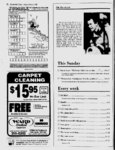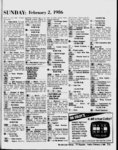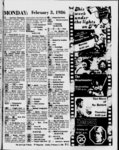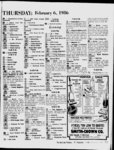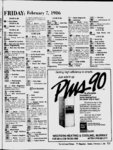| OCR Text |
Show Lone Ranger rides, courtesy F. Striker by John Corr Knight-Ridd- er Newspapers Return with us now to those thrilling days of yesteryear, when out of the East comes the thundering typewriter of the amazing Fran Striker, creator of the daring and resourceful masked rider of the plains, the Lone Ranger, not to mention his great horse, Silver, and his faithful Indian companion, Tonto. Fran Striker, author of 3,000 Lone Ranger radio scripts, writer for The Green Hornet and Sgt. Preston of the Yukon radio series, author of 18 novels and an unknown number of television shows, may be on the verge of one more, posthumous, literary venture. HIS SON, Fran Striker Jr., has dug out his fathers last novel, polished it up and written a final chapter based on the original outline. As soon as he finds a publisher, One More River, the last creation of the creator of the Lone Ranger, will finally see the light of day. In addition to that, Fran Striker Jr. wants to his fathers eight Tom Quest novels because, as he says, young people now need some real heroes. The Masters of the Universe, Spider-Ma- n and the other superheroes that infest Saturday morning television are all very well, he says, but they are not real, not like the Lone Ranger or Tom Quest, a youthful adventurer and explorer with a flair for scientific gadgets. KIDS NEED HEROES they can emulate," he said, How can you emulate Aqua-man- ? se 3 For that matter, how can you emulate the late Fran Striker writer, chemist, carpenter, saxophonist, photographer and maker of elaborate fireworks extravaganzas? He was amazing, says his son and biogcomputer programrapher, a mer from Runnemeade, N. J. At the height of the popularity of the Lone Ranger radio series, he was writing three scripts a week, plus two Green Hornet scripts a week, and his novels. HE ALSO WAS writing the plots and dialogue for all of the Lone Ranger comic strips, and every time the Lone Ranger even if only made a public appearance to open a shopping center he scripted the appearance. The elder Striker became a professional writer in 1915 at the age of 12 when he sold a short story to a newspaper in his home town of Buffalo, N.Y. He was paid $1, a at a time small fortune for a when you could buy a hot dog for a nickel. He studied chemistry at the University of Buffalo, but never worked in the field. The lure of the typewriter was too strong. In 1928, after a fling at producing stage shows, he took a job with a Buffalo radio station, where he had previously earned some money playing his saxophone. His titles at the station included announcer, musician, studio manager, writer, actor and program director. IT WAS AT THIS time that he began writing radio dramas, including a western series called Covered Wagon Days. In the years before the Lone Ranger rode into his life, Striker wrote 41 series of radio dramas ranging from science fiction to what would now be called sitcoms. d He the scripts to stations all over the country, earning about 92 per script. By the middle of 1932, 92 stations had used Strikers scripts. Then along came George W. Trendle. TRENDLE HAD TAKEN over station WXYZ in Detroit and had severed the stations relationship with the CBS network. His idea was that a local station could produce local programming and find local sponsorship without being tied to a network. He had heard of Strikers work and, on Dec. 28, 1932, he sent a letter reading, in part: Will you please write up three or four Wild West thrillers, including all the hokum of masked rider, rustler, killer Pete, heroine on the train tracks, fight on top of bank the boxcars, Indian bad men, two-gu- n robbers, etc. STRIKER, ACCORDING to his son, dug out a script he had previously written for Covered Wagon Days, a script that befree-lance- gan: In the small communities of the West, gambling and gunfighting were everyday affairs, and a man never left his house without being prepared to shoot in defense of his life. Throughout the entire West, in those turbulent days, were circulated stories of a masked rider, a modern Robin Hood, seen by few, known by none. Few men dared to defy this man, and those that did ... lost. FROM THIS, THE character named the Lone Ranger evolved. After a few scripts, Striker decided that his hero needed somebody to converse with to move the plots along. Thus, Tonto was born. The first show aired on Jan. 31, 1933. The Detroit station paid 94 for each script, and Striker was also selling the same scripts to stations in Buffalo and The Salt Lake Tribune, Omaha for similar amounts. A year or so later, Trendle hired Striker as a staff writer and bought the rights to Jhe Lone Ranger from him for 910. (IN THE LATE 1950s, Fran Striker Jr. says, Trendle sold the rights to the Lone Ranger to Lone Ranger Television Inc., a subsidiary of the Wrather Corp., for 93 million.) FOR THE SAME 910, Striker also gave up the rights to two other series he had created, Manhunters" and Thrills of the Secret Service. Dad figured he had been treated with legal fairness, Striker said. In spite of all of his achievements, he was essentially a humble person. He was also a cheerful, friendly and sentimental person who liked parties. He was a good father, but he had kind of weird working habits. He would get up about noon and go down to the station (WXYZ). He would come home for dinner and, afterward, fall asleep on the sofa listening to Lowell Thomas. HE WOULD WAKE up about 10 p.m. and go into the room he used as an office, and he would write until 4 or 5 in the morning. If he wandered out of his office while we four kids were still awake, we knew that it was no use trying to talk with him. He just wasnt with us. His mind was full of plots and gunfights and bank robbers. During the 1950s, Striker wrote or edited all of the Lone Ranger television scripts and the Lone Ranger film serials, in addition to writing his Tom Quest books and his adult western, OneMore River. He was killed in an automobile accident in 1962 at the age of 58. I HAD THOUGHT of writing Dads story for many years, but never got around to it, Fran Striker Jr. said. Then, as 1983 approached, the 50th anniversary of the Lone Ranger, I decided to go ahead and do it. By that time, he said, his own three children had reached adulthood, and he had more time to devote to writing. The result was His Typewriter Grew Spurs, a biography put together from old scripts, letters, notes, conversations and memories. The job was made a lot easier by the fact that Dad was a saver. He kept everything. SO DOES HIS SON. Fran Striker Jr. has a vast collection of scripts, letters, posters and placards, photographs and one genuine silver bullet given to his father by an 143-pa- admirer. TV Magazine, . Sunday, February 2, 1986 T13 |






































































































































